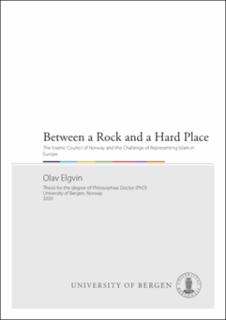| dc.description.abstract | In several European countries the authorities have sought to institutionalize and regulate the Islamic or Muslim presence in their countries through Islamic Representative Councils (IRCs) that can function as interlocutors between Muslim communities and the state. Many of these organizations have been marked by instability, defection, conflict, or splits. This thesis asks why, through a detailed case study of the trajectory of one such IRC – the Islamic Council of Norway (IRN).
Existing research on IRCs has not delved deeply into the question of why so many IRCs have been unstable, but three broad perspectives can be found. One perspective is that there are internal reasons for the conflicts: it is argued that Muslims and Muslim organizations are simply too different from one another, and this may make cooperation difficult. Another perspective is that these conflicts have been caused by external reasons: external conditions or the policies of the authorities made it difficult for these organizations to function well. A third perspective is that the conflicts were caused by a combination of internal and external factors – it is about the competing expectations they face, and the difficulties of dealing with these competing expectations.
The thesis employs a process-tracing approach to explore the trajectory of the Islamic Council of Norway. The organization was created in 1992/1993 and grew stronger for the next couple of decades. The IRN’s performance during the cartoon crisis in 2006 led the government to provide public funding to the organization from 2007 onwards. In the 2010s a conflict began to emerge. One faction advocated a dialogue path, with an emphasis on soft rhetoric and external outreach. Another faction advocated a community path, which aimed at strengthening the internal solidarity in the Muslim communities. Those who were in favour of the community path won the internal power struggle and were able to secure an independent source of funding through a successful system for certification of halal meat. After a prolonged conflict the advocates of the dialogue path decided to break out and create a competing organization. The government took away the IRN’s funding, and the system for halal certification broke down. Following the split, the IRN continued to exist, but now without funding and with a close competitor.
The thesis relies on analysis of different sources of data – primary archival records, secondary literature, oral interviews, and media items – in order to ascertain why these events occurred. Perspectives from earlier scholarly literature indeed point to relevant factors, but the concepts are clarified and the actual mechanisms are unpacked in detail. What earlier researchers have referred to as diversity on the Islamic field is in this thesis conceptualized as multipolarity. Multipolarity played a role since different member organizations in the IRN had different goals. During its phase of consolidation the organization was able to work through these differences. But when the conflict erupted in the 2010s, the multipolarity among the members made it more difficult to find solutions.
Throughout the organization’s history external actors also had an impact. Whereas existing literature mostly talks about the relationship between IRCs and the state, the case of the IRN indicates that intermediary third-party organizations can also be important. In the first couple of decades these organizations acted as stabilizing forces. These organizations helped actors in the IRN to find ways of dealing with the demands from different sectors of Norwegian society. When the organization was beset by stormy weather these organizations were there to help the IRN. In the final phase, however, these organizations did not publicly support the IRN, giving the authorities carte blanche to remove funding from the organization. It was a consistent challenge for the IRN to deal with the competing demands placed on the organization. The thesis details how such competing demands can create challenges and conflicts. The organization mostly tried to deal with such competing demands through balancing solutions which to a certain degree could satisfy all stakeholders. The major difficulties for the organization arose when different factions in the organization wanted to pursue different and conflicting strategies for dealing with these competing demands.
In addition to these existing perspectives from the literature, this thesis also shows that organization matters. The challenges IRN experienced are not unique to IRCs as Islamic or migrant-dominated organizations. In the thesis the IRN is conceptualized as a meta-organization: an organization whose members are organizations themselves. Meta-organizations often have weak central hierarchies and are therefore ill-suited to deal with conflicts and deep disagreements.
Crucially, the thesis shows that all of these factors interacted with one another. When a meta-organization is placed in a politicized environment that frequently requires it to take a stand on controversial issues, when it has a multipolar membership base and faces external actors that place difficult demands on the organization, conflicts and difficulties easily arise.
This thesis is the first study to explore in depth why IRCs seem prone to conflicts and splits. The main factors identified – the multipolarity of the Islamic field, the influence and meddling of external actors, the multiple demands the organizations are facing and disagreements about how to relate to these demands, the difficulties of solving conflicts due to the weak hierarchy of meta-organizations, and the interplay between these factors – have probably played a role in the conflicts in other IRCs as well. For the research fields of political science and Islamic studies on the one hand, and authorities and Muslim organizations in Europe on the other, this dissertation brings new conceptual and empirical knowledge. It elucidates why it remains a challenge to ensure that relations between authorities and IRCs can be beneficial both to society at large and to the Muslim communities themselves. | en_US |
